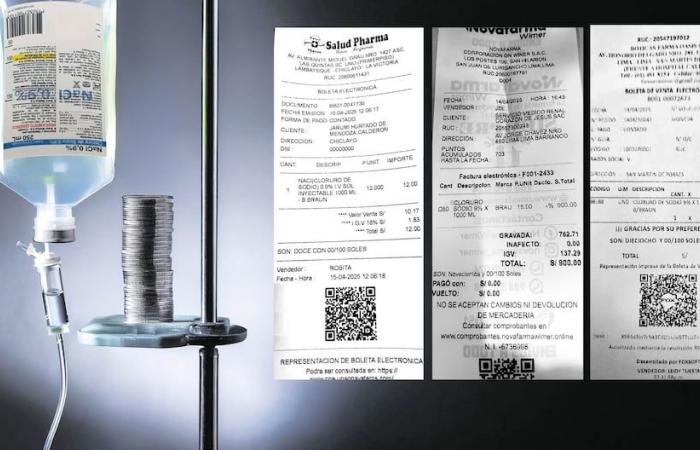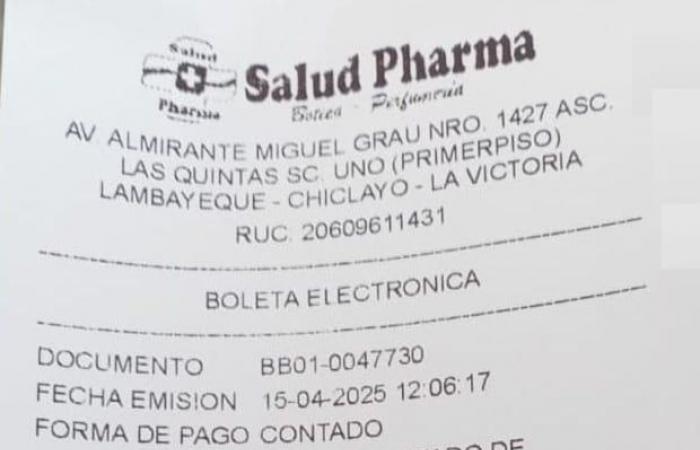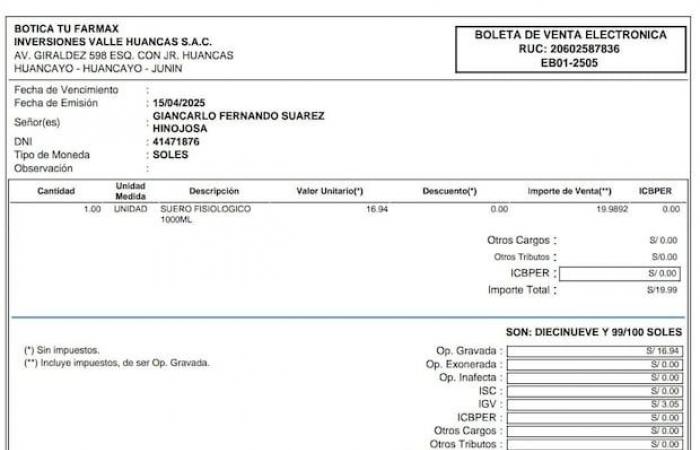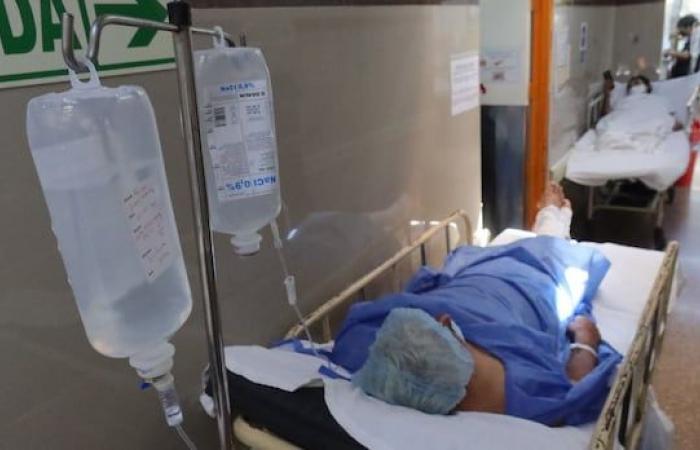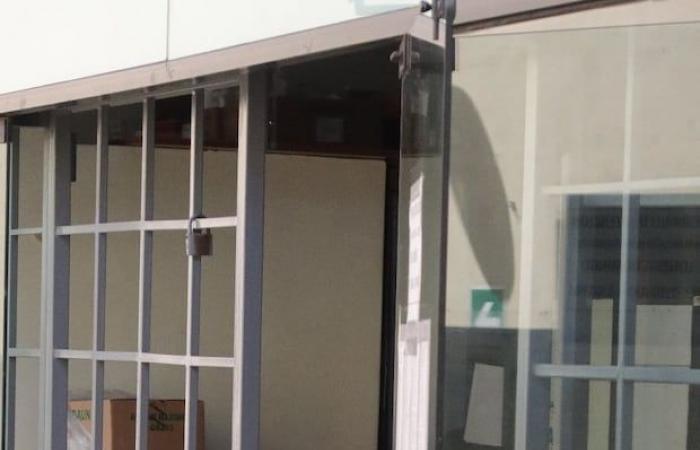The case of the failed lot of the medifarma serum-which caused the death of at least seven people-has generated a situation similar to what happened in the Covid-19 pandemic with the masks or oxygen: a disproportionate increase in the price of these products.
As he checked Commerce After accessing sales and traveling tickets, a liter of 0.9% sodium chloride (physiological serum) of Laboratory B. Braun (the other firm that sells the product in the Peruvian market) costs until S/19.9, when before each unit was S/2.98. That is, the value grew more than 570% since the end of March, when it was known about the first victims of the case. The price of the units of 100, 250 or 500 milliliters also increased.
An example is the purchase of 60 units that the Heart of Jesus Medical Service, in Barranco, made Novofarma in April in San Juan de Lurigancho. Each unit of a liter cost him S/15. Paid S/900 in total. The price would have been S/178.8 if the unit followed S/2.98.
Ballow of what the Heart of Jesus Medical Service paid for 60 units of serum.
Gustavo Cabrera, administrator of the Heart of Jesus, pointed to Commerce They have paid to S/20 per unit of serum. “In some cases we are buying from pharmacies, they are the ones that speculate with prices […]. What happens is that Braun is not supplying, he is rationing for everyone. It supplies us, but with a minimum amount, not with the amount we need to perform the 1,500 dialysis sessions per month for our renal patients. ”

In Chiclayo they paid S/12 per liter of serum B. Braun.

In Huancayo they paid almost S/20 for a one -liter serum.
Measures with problems
In the Peruvian market, B. Braun Medical Peru sells about 20% of physiological serum. Medifarma had at least 80% of the market, but at the end of March the General Directorate of Medicines, Supplies and Drugs (DIGEMID) of the Ministry of Health (MINSA) temporarily closed the area of the company that produced the serum in the case of the defective lot. After that measure, B. Braun reported that it has not “increased” the serum price of a liter “to any customer” and that it had even reduced the sale price to state institutions.
But that does not happen when the product reaches pharmacies and distributors.

Given the problem through Medifarma, in hospitals such as May 2, the serum of B. Braun is being used, according to a tour of El Comercio in the place. (Photo: Alonso Chero)
“What is happening is that they are buying from distributors and what they are doing is surely [que] They have a stock of serum medicines, in this case that they have surely had a long time, and they are selling it with surcharge for the demand that has increased greatly. The same happened with the masks, for example, in the pandemic, ”explained Hernán Ramos Romero, general manager of the association of Private Clinics of Peru.
- Medifarma case: Prosecutor incorporates three more workers as investigated by defective physiological serum
Ramos said that there is no capacity to compensate for serum demand because, according to a calculation of its association, about 150,000 units are consumed every day. Of that figure, 50,000 would correspond to the private sector. “Then, if 85% or a little more is produced by one company, then what the other company can produce, say, in the short term, it will not cover the demand you have.”

Serum boxes B. Braun at the Dos de Mayo hospital. (Photo: Alonso Chero)
After DIGEMID made the decision on Medifarma, the Executive published the emergency decree 02-2025, which allowed to use the company already produced from the company, prior quality control carried out by the National Institute of Health (INS). He also authorized the import of sodium chloride of 0.9%. The rule governs until December 31. In addition, Digemid issued resolutions that authorized the exceptional use of medifarma lots analyzed by INS. Then the closure of Digemid was announced.
- Lethal serum of medifarma circulated since the end of January: MINSA does not report how many units have recovered
According to Ramos, the product is already imported from countries such as Argentina or Mexico, for example, but there are problems, such as the weight of the lots or the time that the process takes, including the previous tests that must be done. “Import delay three weeks to get to customs, and from there two more weeks to do [las pruebas]”, said.
With import there are also problems due to overpricing. At the end of April it was known about the purchase of serum for S/57.1 million that EsSalud made to Master Medical, a firm based in El Salvador created six months ago with a capital of US $ 2,000. One of its owners is Juan Sebastián Vinelli Ayala, Ecuadorian businessman who has been linked to the Panama Papers case. According to information that the trade reviewed, in this purchase there was an extra cost of S/44.8 million. Master Medical sold the serum of a liter at S/12.79. EsSalud had to cancel the acquisition.
What will happen now?
Víctor Dongo Zegarra, former director of DIGEMID and representative of the Medical College of Peru, commented that so far the MINSA has published 572 quality control results of the medifarma serum that can be used. However, he estimated that 47% would be completed. He stressed that there are hospitals that have not been able to use sera because they are stored waiting for that result, which forces these institutions to buy directly and generates cost overruns.
Given the impending serum shortage in public and private entities, Dongo urged a quick solution to be found because patients will be those affected. For the medium term, he said that it must be defined what will be done with the Medifarma laboratory. This is due to the large amount of serum it produces. He recalled that the firm sold about 22 million units a year to state entities.
- “I never worked with the willing
The former health minister Óscar Ugarte considered the decision of Minsa (through Digemid) to close the medifarma plant. “That speculation [es] As a result of a wrong decision that has generated this shortage. ”However, he caught attention to how a company has more than 80% of the market.“ How can a company have a monopolistic control of the market? Where are the laws, the rules? ”He wondered.
Julio Castillo, director of the National Center for the Supply of Strategic Health Resources (CENARES), detailed the measures that Minsa has taken to avoid shortage in health centers, such as purchases abroad.
- Architect dies after staying a month with brain death: there are already 7 victims of defective medifarma serum
“Tomorrow they must enter 800 thousand more units of sodium chloride that we buy from the Baxter Laboratory of Colombia. To May 15 we are already completing 1’177,000 units that have cost S/3.70 the unit. More taxes gives a total of S/4.89”. In addition, he said there is a 6.9 mlls stock. of units for the coming months.
On the temporary closure of the Medifarma Laboratory, he said: “The lifting of the sanitary registration, which is the suspension of the sanitary registry, this week will pass a control audit. There were four irregularities detected to medifarma. Three have been overcome, but no. If they raise that non -conformity, it means that the sanitary record to the company is restored, and they will be able to re -manufactured again. Health establishments, both public or private. ”

